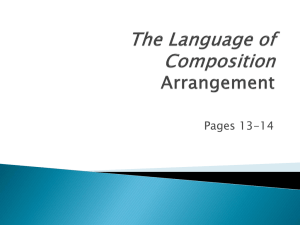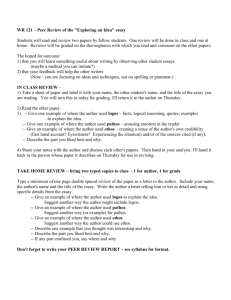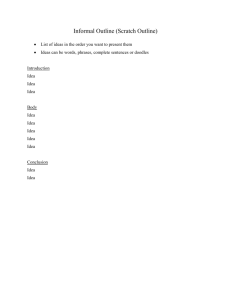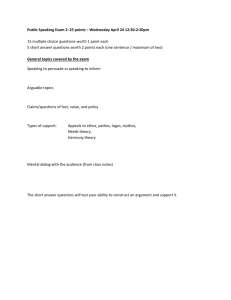Persuasive Essay
advertisement
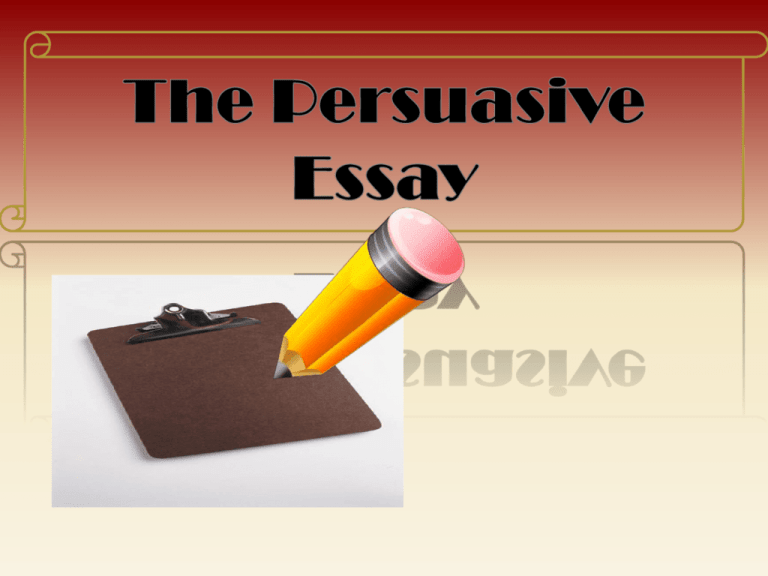
An
argument
Persuades
the audience
to believe in
your opinion
on the topic.
Uses
reasoning,
facts,
examples,
and quotes
to convince
the reader.
In an episode of “Everybody Loves Raymond,” Marie
writes a persuasive letter to the FBI interviewer whom
is interviewing Robert (her son)…
http://www.youtube.com/watch?v=0cThuaPUD_Q&feature=PlayList&p=16B069ABF7F2
4A36&playnext=1&playnext_from=PL&index=15
What is the issue
that Marie is arguing
to the FBI boss?
What
reasons/examples
does she use in her
letter to persuade
the boss?
FIRST ASK YOURSELF:
How will this situation/controversy
affect me?
How will it affect my family?
How will it affect my school/peers?
How will it affect my community?
How will it affect our society?
How will it affect us physically,
emotionally, financially, and socially?
Pick your position: which side of the
problem/issue are you on?
SUPPORT
AGAINST
• Phillies
• Yankees
• Blackberry
• iPhone
•Giants
•Jets
FIRST BODY PARAGRAPH:
SECOND PARAGRAPH:
Transition Word: ______
Transition Word: ______
First Body Paragraph Reason
Supporting Detail 1
Supporting Detail 2
Supporting Detail 3
Second Body Paragraph Reason
Supporting Detail 1
Supporting Detail 2
Supporting Detail 3
INTRODUCTION PARAGRAPH: List your hook, opinion and 3 reasons
THIRD BODY PARAGRAPH:
Transition Word: ______
Third Body Paragraph Reason
Supporting Detail 1
Supporting Detail 2
Supporting Detail 3
CONCLUSION:
Can you state a possible alternative?
(Another option)
Restate your opinion with your three
reasons.
End with a closing, thought-provoking
sentence.
PERSUASIVE ESSAY
Next Step
• After Brainstorming it is
important we clearly
identify and understand
who our audience is for
this particular topic.
Identify in the “WRITING TASK” If you’re
writing a letter and to whom.
• “Write a letter to the newspaper” = Dear Editor,
• “Write a letter to board members” = Dear Board of
Education Members,
• “Write a letter to your principal” = Dear Principal,
• “Write a letter to the mayor” = Dear Mayor,
• “Write an essay” = You do not need an opening
salutation
HOOK
INTRODUCTION
STARTLING STATISTIC/FACT
INTERESTING QUOTE
STRONG/INTERESTING STATEMENT
EXAMPLE (EXPLAIN IN DETAIL) OR “IMAGINE IF….”
RELATE TO EVERYDAY LIFE
A THOUGHT PROVOKING OR RHETORICAL QUESTION
ANECDOTE (VERY BRIEF, SOMETIMES FUNNY STORY
RELATING TO YOUR TOPIC.)
STATE THE SITUATION
WHAT IS THE PROBLEM/SITUATION? (YOU CAN PULL
FROM THE PROMPT)
STATE YOUR OPINION WITH YOUR 3 REASONS
“I FIRMLY BELIEVE….” = THESIS STATEMENT
REMEMBER:
You must
connect your
HOOK to the
writing
situation. They
can’t remain
separate.
There must be a
sentence
linking the two
thoughts
together.
Common Transition words or
phrases:
•
•
•
•
•
Therefore
Furthermore
Also
In addition
On the other hand (to show the
opposite side)
•
•
•
•
•
For example
Moreover
As a result
Finally
Similarly
SEE ATTACHED
SHEET FOR MORE
TRANSITION
WORDS/PHRASES
TRANSITION WORDS
WORDS THAT CAN BE USED TO SHOW LOCATION:
Above
Across
Against
Along
Among
Around
Behind
Below
Beneath
Beside
Between
Beyond
By
Down
In back of
In front of
Inside
Into
Near
Off
Onto
Outside
Over
Throughout
To the
right
Under
underneath
WORDS USED THAT CAN BE USED TO SHOW TIME:
While
After
At
Before
During
First
Second
Third
Now
Until
Meanwhile
Today
Tomorrow
Next week
Yesterday
Soon
Later
Afterward
About
Finally
Then
Next
As soon as
When
suddenly
WORDS THAT CAN BE USED TO COMPARE TWO THINGS:
Likewise
Also
While
Like
As
Similarly
In the same way
TRANSITION WORDS
WORDS THAT CAN BE USED TO CONTRAST TWO THINGS:
WORDS THAT CAN BE USED TO CLARIFY:
But
Still
However
Although
Yet
On the other
hand
Otherwise
That is
For instance
Even though
WORDS THAT CAN BE USED TO EMPHASIZE A POINT
Again
Truly
Especially
To repeat
In fact
To emphasize
For this reason
WORDS THAT CAN BE USED TO ADD INFORMATION
Again
Another
For instance
For example
Also
As well
Next
And
Besides
Finally
Moreover
Along with
In addition
For example
Additionally
Other
In other words
Concluding Transitions
•
•
CHEETTA
•
•
•
•
•
Clearly
Hence
Evidently
Ergo (a continuing thought)
Thus
Therefore
As one can see
NO SECOND PERSON PRONOUNS!
• “YOU” “YOUR “YOURS” SHOULD NOT BE USED IN
FORMAL WRITING!
• “You” is sometimes acceptable in the introduction
paragraph for your HOOK only, but nowhere else.
It is considered informal. We should NOT
write how we speak, put your tuxedo
and best dress on when you write!
• Use “we, us, our, ours” or “one” or “students”
First Body Paragraph
ALWAYS NEED A TRANSITION WORD/PHRASE:
STATE ONE REASON WHY YOU AGREE OR DISAGREE
CAN APPEAL TO THE AUDIENCE’S LOGIC, EMOTIONS, OR
MORALS
EXPLAIN 3 SUPPORTING DETAILS TO
SUPPORT/PROVE YOUR REASON:
SUPPORTING DETAIL
SUPPORTING DETAIL
SUPPORTING DETAIL
Include specific
examples and
allusions. BONUS
POINTS!
Types of Arguments
• LOGOS (logic) means an argument based on reason.
• PATHOS (passion or emotions) is the use of
emotional arguments to get the audience to accept
one’s viewpoint. It is intended that the message
inspire followers.
• ETHOS (ethics or morals) is a moral or ethical
argument that appeals to the reader’s morals or
values; what the reader believes is morally or
ethically right. Aristotle called it the “moral
rightness” of an argument.
Rhetoric = The Art of Persuasion
The history of rhetoric and the concepts of
ethos, pathos and logos began in Greece.
Who was Aristotle?
Aristotle was a famous Greeek
philosopher who studied the art of
persuasion.
Plato, another
famous Greek
philosopher, was
his teacher.
Ethos, Logos and Pathos
In approximately 300 B.C.E. Aristotle, who was a
famous Greek philosopher, wrote a book entitled, “The Art
of Rhetoric.” In his book, Aristotle identified the three
methods of persuasion. He called them ethos, pathos and
logos.
Ethos = a MORAL argument
• The word "ethos" came from the Greek word “ethikos”
meaning moral or showing moral character.
• An “ethos” argument demonstrates a moral or ethical
argument that appeals to the reader’s morals or values;
what the reader believes is morally or ethically right.
For example: If your friend did something to
offend you (hurt you) your mother or father
may argue that forgiveness is the right or moral
path to choose and that holding a grudge or
showing resentment will get you nowhere.
Pathos = an EMOTIONAL argument
• An effective use of “pathos” will alter the mindsets of the
audience through the use of emotional appeal.
• Appeals to pathos touch a nerve and compel people to
not only listen, but to also take the next step and act in
the world.
• Those who wish to persuade you will play with your
emotions. They may persuade you with fear, love,
patriotism, guilt, hate or joy.
Logos
Logos means logic
• Logos refers to any attempt to appeal to the
intellect OR, our brains.
• Logos appeals to the left side of the audience's
brain. The audience relies on reasoning and facts
to make its decision.
– Numbers, polls and statistics are also examples of the
persuasive use of logic.
REVIEW
Ethos, Pathos and Logos
1. ETHOS= an ethical or moral
argument
2. PATHOS= an emotional
argument
3. LOGOS= a logical argument
Logos (logic) means an
argument based on reason.
• Examples:
– “OnStar service inside your car is better than carrying a
cell phone because a cell phone can’t call for you when
you’re injured.”
– “There was no discernible difference in the ACT scores
of graduating seniors who wore school uniforms and
those who didn’t.”
– “Stand firm, parents. If you say ‘no’ at first and then
give in later, you are only teaching your children to beg,
whine and pester you.”
PATHOS (passion or emotions) is the use of emotional
arguments to get the audience to accept one’s viewpoint. It
is intended that the message inspire followers.
• Examples:
– A politician says that we have to fight the war “over”
there so that we don’t have to fight it here at home.
– A newspaper editorial for private-school vouchers
states that our public schools are “dens of thieves and
thugs”.
ETHOS (ethics or morals) is a moral or ethical argument that
appeals to the reader’s morals or values; what the reader
believes is morally or ethically right.
• Examples:
– “Ask not what your country can do for you; ask what
you can do for your country.” — John Fitzgerald
Kennedy
– “The way ahead is not easy. We shall need all the
wisdom, imagination, and courage we can muster. We
must and shall guarantee the civil rights of all our
citizens.” – Harry Truman addressing the NAACP
Ethos, Pathos, or Logos?
Identify what type of argument matches each
statement. Write your answer beneath the quote.
• “We are the only company who will roll over and save your
unused phone minutes each month.”
•
LOGOS!!
• “I have a dream that my four little children will one day live in
a nation where they will not be judged by the color of their
skin but by the content of their character.” – Martin Luther
King Jr.
•
ETHOS!!
• A high school runs an article about drinking and driving with
detailed descriptions and graphic pictures of automobile
crashes.
•
PATHOS!!
How to Build Strong Body Paragraphs
Real-Life Examples & Allusions
in Body Paragraphs
• It is also important that we try to include “real-life”
examples in our body paragraphs. Including real-life
examples will enhance your writing.
• SAMPLE:
– Topic: Athlete's are overpaid.
– Real life example in body paragraph:
• I remember my thirteenth birthday party like it was yesterday. It
was a wonderful day until my father informed me that he could not
afford to purchase the tickets to the Giant’s game I wanted so
badly to attend. At first I became angry, but then I realized that the
tickets were over $200 each for average seats. I then realized I
could enjoy the game more with my family at home and big bowl
of popcorn.
Real-Life Examples & Allusions
in Body Paragraphs
• Allusion – Reference to something outside the text.
• Including allusions in our writing can also enhance our
essays.
–
–
–
–
–
–
–
–
–
Historical figures
A time period in history
Current event in the media
Literary character
Movie
Book
Poem
Song
Quote by another author
Second Body Paragraph
ALWAYS NEED A TRANSITION WORD/PHRASE:
STATE ONE REASON WHY YOU AGREE OR DISAGREE
CAN APPEAL TO THE AUDIENCE’S LOGIC, EMOTIONS, OR
MORALS
EXPLAIN 3 SUPPORTING DETAILS TO
SUPPORT/PROVE YOUR REASON:
SUPPORTING DETAIL
SUPPORTING DETAIL
SUPPORTING DETAIL
Include specific
examples and
allusions. BONUS
POINTS!
Third Body Paragraph
ALWAYS NEED A TRANSITION WORD/PHRASE:
STATE ONE REASON WHY YOU AGREE OR DISAGREE
CAN APPEAL TO THE AUDIENCE’S LOGIC, EMOTIONS, OR
MORALS
EXPLAIN 3 SUPPORTING DETAILS TO
SUPPORT/PROVE YOUR REASON: This is where you can
SUPPORTING DETAIL
SUPPORTING DETAIL
SUPPORTING DETAIL
Include specific, real-life
examples and allusions.
BONUS POINTS!
acknowledge the
opposition. Prove the
other side is wrong.
Choose one argument
from the other side and
prove it is wrong.
Explain and refute the opposite view within your essay…
These newscasters argue that cell
phones SHOULDN’T be allowed in
schools. One newscaster tries to refute
or negate their argument, but she
doesn’t do a great job. What other
argument could you use to “negate the
opposition” (prove the other side
wrong).
http://www.youtube.com/watch?v=ZTKZ6jovfso
How would you
refute or negate
the two
newscasters’
opinion that cell
phones shouldn’t
be permitted in
schools?
CONCLUSION PARAGRAPH
TRANSITION PHRASE: “AS ONE CAN SEE…..”
1. RESTATE YOUR OPINION AND THREE REASONS.
STATE A POSSIBLE ALTERNATIVE {ANOTHER
OPTION}. (NOT IN EVERY ESSAY)
2. INCLUDE A SENTENCE OR A QUESTION TO BRING
CLOSURE.
THOUGHT-PROVOKING STATEMENT OR
QUESTION
Final Thoughts…
Wrap up your final thoughts, and restate your
opinions in the last paragraph on the essay.
Restate (in a creative way)
the important points/main
idea in the essay
Regain your audience’s
interest in your ideas
CONCLUSION
Address your audience with
a call of action or question
Most important part of the
essay: Spend time editing
and planning your
conclusion carefully!!
Reasons to Know How to
Write a Persuasive Essay…
• Every good speech, discussion or essay needs strong
closure to force the reader or listener to think carefully
about what you have just said or written.
•Emphasizes critical thinking and analysis skills
• Relativity: Writing to a newspaper on a local/national
issue that concerns you
Or to sway a institution/company’s decision
• Provides practice for college admissions/cover letter
writing
• Required to demonstrate this skill on the Standardized
Testing
Persuasive Techniques are Everywhere!
• http://www.youtube.com/watch?v=jaGJNxCxB
-s&feature=related
Bringing Life to
Persuasive Writing
That’s
SO
TRUE!
Who
CARES?
Having a Strong VOICE in your
Writing
• You feel a strong connection to the
writer’s…
–Emotion
–Energy
–Conviction
–Integrity
–…you feel SOMETHING!
Voice is…
• Person behind the words
• Reader
Writer
• Involvement
• Awareness of audience
• Individualistic
• Expressive
Who’s Voice is This?
8:00 am – Dog food! My favorite thing!
9:30 am – A car ride! My favorite thing!
9:40 am – A walk in the park! My favorite thing!
10:30 am – Got rubbed and petted! My
favorite
thing!
12:00 pm – Lunch! My favorite thing!
1:00 pm – Played in the yard! My favorite thing!
3:00 pm – Wagged my tail! My favorite thing!
5:00 pm – Milk bones! My favorite thing!
7:00 pm – Got to play ball! My favorite thing!
8:00 pm – Wow! Watched TV with the people! My
favorite thing!
11:00 pm – Sleeping on the bed! My favorite thing!
Who’s Voice is This?
Day 983 of my captivity. My captors continue to taunt me with bizarre
little dangling objects.
They dine lavishly on fresh meat, while the other inmates and I are
fed hash or some sort of dry nuggets. Although I make my contempt for
the rations perfectly clear, I nevertheless must eat something in order to
keep up my strength. The only thing that keeps me going is my dream
of escape. In an attempt to disgust them I once again vomit on the
carpet.
Today I decapitated a mouse and dropped its headless body at their
feet. I had hoped this would strike fear into their hearts, since it clearly
demonstrates what I am capable of. However, they merely made
condescending comments about what a ‘good little hunter’ I am. There
was some sort of assembly of their accomplices tonight.
Who’s Voice is
This?
I was placed in solitary confinement for the duration of the event.
However, I could hear the noises and smell the food. I overheard that my
confinement was due to the power of ‘allergies.’ I must learn what this
means and how to use it to my advantage…
Today I was almost successful in an attempt to assassinate one of
my tormentors by weaving around his feet as he was walking. I must try
this again tomorrow – but at the top of the stairs. I am convinced that
the other prisoners here are flunkies and snitches. The dog receives
special privileges. He is regularly released – and seems to be more
than willing to return. He is obviously an idiot. The bird has got to be
an informant. I observe him communicating with the guards regularly. I
am certain that he reports my every move. My captors have arranged
protective custody for him in an elevated cell, so he is safe. For now…
Be certain to:
Read each paragraph
carefully more than
once to see what
makes this sample
essay a good one.
Review actual graded
NJ ASK persuasive
essays on the class
website.
Note the scores
and understand
WHY they received
them.
Note the strengths
AND the
weaknesses!!
Summer: 15 Days or 2 1/2 Months?
Student Example – INTRODUCTION paragraph
Student’s
Opinion
Student’s
3 reasons
The final bell rings. It’s the last day of
school, and summer has finally come!
Students don’t have to think about school for
at least another 2 1/2 months. That is the way
it should always be. Schools should continue
using the traditional calendar and not a yearround schedule (position). There are
numerous downsides to year-round
schooling. It has no positive effects on
education (1), it adds to costs (2), and it
disrupts the long-awaited summer vacation
(3).
OPINION + 3 REASONS = THESIS STATEMENT
Paragraph 2 – Reason 1 = Student Example
Contrary to the well-accepted belief, yearReason 1 round schooling has no constructive impact on
education. (1) Most year-round schedules use the
Supporting 45-15 method: 45 days of school followed by 15
days off. Because of this, there are many first and
Detail 1
last days of school. All those transitions disrupt
the learning process. Also, (2) there is no evidence
Supporting of higher test scores. Due to that, many schools
Detail 2
that change to year-round schedules end up
switching back. For example, (3) since 1980, 95
Supporting percent of schools that tried the year-round
Detail 3
schedule changed back to a traditional calendar. It
is obvious that changing to year-round schooling
does not help students; therefore, why is the
with a thought-provoking
change necessary? Get the reader thinking
question.
Paragraph 3 – Reason 2 - Student Example
Like any other facility, keeping a school open
requires a great deal of money. When a school changes
Reason 2 to a year-round schedule, the costs skyrocket. (1)
Keeping school open in the middle of summer requires
air conditioning, and that adds significantly to the
Supporting
school’s expenses. The usual utility bills grow because
Detail 1
of the additional open-school time. Finally, (2) teachers
Supporting must be paid for all the weeks they are working. With
Detail 2
all these factors, the cost of keeping schools open
becomes immensely high. For example, (3) a high
Supporting school in Arizona had a cost increase of $157,000 when
they switched to year-round schooling. Some schools
Detail 3
may not be able to handle such increases, and other
schools that can handle these expenses could be doing
better things with the money. Is year-round school
really where the money should go?
Paragraph 4 – Reason 3 - Student Example
Reason 3
Supporting
Detail 1 & 2
Supporting
Detail 3 & 4
An important part of a child’s life is summertime.
With year-round schedules, students would hardly have
any time to relax. (1) During the 15-day breaks, they
would be thinking about their quick return to school. (2)
It would also be difficult to coordinate family vacations
with parents’ work schedules. (3) Similarly, children
would not be able to go to most summer camps. (4) One
expert, Dr. Peter Scales, says, “The biggest plus of camp
is that camps help young people discover and explore
their talents, interests, and values. Most schools don’t
satisfy all these needs. Kids who have these kinds of
[camp] experiences end up being healthier and have
fewer problems.” Obviously, the summer is crucial to a
child’s learning and development. Why should this
invaluable part of a young person’s life be taken away?
Get the reader thinking with a thought-provoking question.
Paragraph 4 Reason 3 (also includes
negating the opposition)
• Despite my personal opinion, I understand that some may
not fully agree with the idea of continuing the traditional ten
month school year. Nevertheless, for those who believe
adjusting the school calendar is beneficial for all students and
can contribute to a consistent learning process, I have two
words for you: overwhelming anxiety. Students are in need of
an elongated summer break to ensure they can set the
anxiety and stress associated with school and enjoy time with
their families. Even my mother and father take the time to
vacation in the summer in order to get away. By stepping
away from the traditional school calendar we will create more
havoc in the lives of our families and in all students’ lives
creating overwhelming anxiety for all involved.
Paragraph 5 – Conclusion - Student Example
Concluding
transition
phrase
As one can see, it is evident that
year-round schooling is not the best
option for the school calendar. There
is absolutely nothing wrong with the
traditional school year. Why change
something that works so well? The
final bell rings. Let’s make sure this
bell means that the “real” summer
vacation has come.
An example for the other side….
Counterargument –(opposite side)
Student Example
Reason 1
Reason 2
Reason 3
But does this really make sense to everyone? (1)
Teachers and other education professionals spend a lot of time
at the beginning of the school year reviewing material from
the previous year. These days and weeks of “review” could be
used more effectively if the lessons continued to move
forward , not backward. Also, By having their children in
school with short breaks in between sessions, parents would
not have to pay for additional, expensive childcare. Even if (2)
there are no classes taking place during summer hours, the
building is still being used, therefore utility costs remain
consistent throughout the year. (3) And finally, there has been
a significant increase in families staying home during the
summer months due to the downturn in the economy.
Because of this, travel and vacations have become practically
nonexistent for families with school age children. According to
AAA, last year alone, there was a 53% decrease in air travel.
Planning Your Persuasive Essay
1. Clearly state your position. What do you believe
about the issue? What are your reasons for
believing that way?
2. Consider your audience. What do your readers
know about the issue? What are their opinions on it?
3. Gather support for your arguments. Where will
you find the information you need? What facts,
statistics, examples, anecdotes, and quotations
support your position? Which evidence is strongest?
What support might people who object to your
position present? How can you answer those
objections?

